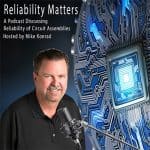
The Trouble with Habits
Abstract
Chris and Fred discuss the issues we often have with ‘habits.’ Habits can be good for us. But ‘bad habits’ are just that. Ever heard the excuse ‘but that’s the way we have always done it?’
ᐅ Play Episode
Your Reliability Engineering Professional Development Site
by Christopher Jackson Leave a Comment

Chris and Fred discuss the issues we often have with ‘habits.’ Habits can be good for us. But ‘bad habits’ are just that. Ever heard the excuse ‘but that’s the way we have always done it?’
ᐅ Play Episode
by Christopher Jackson Leave a Comment

Every industry has its own way of characterizing reliability metrics. For example, the ball bearing industry uses the metric ‘B_10’ to represent the time by which they expect 10 % of all ball bearings of a specific type to fail. Electronic component manufacturers use the term ‘Failures in Time’ of ‘FITs’ to describe the reliability of their products. But what is a FIT? And how can you use it to measure reliability? Did you know that many electronic manufacturers advertise ‘FIT values’ that imply a mean time to failure of over 1 000 years? If you are involved in electronic component reliability, then join us for this webinar!
[Read more…]
by Mike Konrad Leave a Comment

One of the most critical aspects of manufacturing high-reliability circuit assemblies is thermal profiling during the reflow process.
Whether you’re designing, engineering, or troubleshooting circuit assemblies, understanding how temperatures during the reflow process influences the quality and performance of your assemblies is essential.
In this episode, we’ll break down what thermal profiling is, why it’s important, and how it affects everything from solder joint integrity to component placement.
We’ll also explore the challenges and solutions involved in getting your thermal profile just right, ensuring your circuit assemblies are built to last in a competitive and demanding industry.
Will review thermal profiling best practices, common mistakes, and the various capabilities of thermal profilers.
by Dianna Deeney Leave a Comment

Dianna and Fred discuss design justice: what it means for engineers in industry.
ᐅ Play Episode
by Dianna Deeney Leave a Comment

Dianna and Fred discuss sources of uneasiness with AI and its use within industry.
ᐅ Play Episode
by Dianna Deeney Leave a Comment


There are myths of product development that Quality can help with.
In the previous Part 1, we talked about how we cannot treat the product development process like a manufacturing process. But, there are ways we can apply Quality to the product development process without doing this. Quality can help with early concept development, to evaluate data, and to manage teamwork.
Listen to this Part 2 as we continue to unpack Harvard Business Review’s “The Six Myths of Product Development” by Stefan Thomke and Donald Reinersten. We review the final three of the six myths in the article, revealing the misconceptions around timing development cycles, getting things right the first time, and adding many features.
Discover how quality thinking and systems approaches not only enhances collaboration but also improves user experience from the ground up. By integrating insights from the concept phase, teams can make more informed and strategic decisions throughout the development lifecycle.
by Christopher Jackson Leave a Comment

Chris and Fred discuss reliability engineering … and vacations/holidays! … how are we going to make this topic relevant …
ᐅ Play Episode
by Christopher Jackson Leave a Comment

Chris and Fred discuss how to calculate ‘confidence’ and other things regarding probability and statistics … particularly as it applies to reliability!
ᐅ Play Episode
by Fred Schenkelberg Leave a Comment

System or Operational Effectiveness is comprised of three elements. An early definition included capability, reliability, and availability. Another early definition included availability, dependability, and capability. In essence, can the system do what it’s supposed to do? Is it ready when needed? And is it able to work without failure long enough?
Let’s examine system effectiveness and its factors or elements in more detail. Then, examine an example or two so you can apply this concept to your situation.
by Mike Konrad Leave a Comment

If you’re part of the electronics landscape, you’ve likely encountered the role contract manufacturers play — and it’s a critical one. These specialized partners bridge the gap between design innovation and full-scale production, bringing efficiency, expertise, and flexibility to the table.
by Carl S. Carlson Leave a Comment

Carl and Fred discuss the ideal pace for teaching and facilitating teams. Too fast and students or team members cannot keep up. Too slow and the team loses interest.
ᐅ Play Episode
by Carl S. Carlson Leave a Comment

Carl and Fred discuss the broad subject of reliability ethics, what it means, and how it impacts reliability professionals.
ᐅ Play Episode
by Dianna Deeney Leave a Comment


There are myths of product development that Quality can help with.
How do we integrate quality with product development? Using quality tools and techniques early in the design phase can lead to more successful outcomes. But we cannot do it by treating the product development process like a manufacturing process.
Listen to this Part 1 as we unpack Harvard Business Review’s “The Six Myths of Product Development” by Stefan Thomke and Donald Reinersten. We review three of the six myths in the article, revealing the misconceptions around resource allocation, batch processing, and rigid development plans.
Join us as we review why treating a product development process like a manufacturing process is riddled with pitfalls. The reasons why it doesn’t work provides us understanding to what we CAN use quality tools and techniques to do to improve product development.
This is Part 1. Tune into the next episode for Part 2, where we will review the remaining three myths of product development.

Kirk and Fred discuss long-term reliability and the speed of technological obsolescence.
ᐅ Play Episode

Kirk and Fred discuss the problem or benefits of having confirmation bias, where we accept or reject test results based on expectations.
ᐅ Play Episode